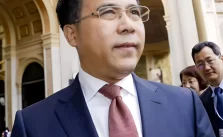By Ben Nsemo
Former Chairman of the Bank of China, Liu Liange, has been sentenced to death with a two-year reprieve by the Jinan Intermediate People’s Court in Shandong Province.
The verdict, delivered on November 26, 2024, found Liu guilty of accepting bribes worth 121 million yuan (approximately $16.7 million) and approving illegal loans totaling 3.32 billion yuan, causing financial losses of over 190 million yuan.
The court ordered the confiscation of all Liu’s personal assets and imposed a lifetime deprivation of his political rights.
In China, a death sentence with a two-year reprieve often allows for the possibility of commutation to life imprisonment, provided the convict exhibits good behavior during the reprieve period.
This severe ruling reflects the Chinese government’s intensified anti-corruption drive targeting high-ranking officials and influential figures, particularly in the financial and political sectors.
By prosecuting such cases, the government reinforces its zero-tolerance policy on corruption, aiming to maintain discipline and deter illicit practices within critical institutions.
Liu’s conviction underscores the broader efforts of China’s leadership to uphold transparency and accountability, further solidifying its commitment to combating corruption at all levels.
